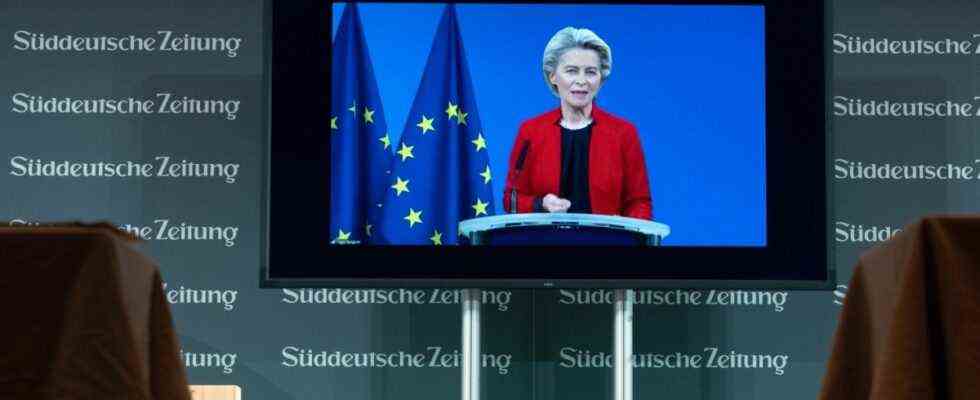EU Commission President Ursula von der Leyen criticized the results of the climate conference in Glasgow on Monday as not being too ambitious. In view of the pressing challenges, the result is “just an intermediate step and not a great success,” she said at the SZ economic summit in Berlin. Von der Leyen was connected to the conference via video. At the same time she defended the ambitious climate protection program of the EU.
The CDU politician described it as a disappointment that during the negotiations in Glasgow the global “coal phase-out at the very last minute was only diluted into coal mining”. In addition, the industrialized countries would not provide sufficient financial support to poor countries in the green restructuring of the economy. Europe has fulfilled its promises here, “but others do not”.
Lobby associations are already warning of disadvantages for European companies if other economic blocs progress more slowly than the EU on climate protection. Wolfgang Große Entrup, the managing director of the German Chemical Industry Association, complains that “many countries are postponing uncomfortable measures further into the future, while Europe is already massively pushing ahead with the climate-neutral restructuring of the economy”. The EU must now “ensure that the domestic industry does not come under the wheels during the transformation”. Markus Beyrer, Director General of the European umbrella organization Business-Europe, also criticized the fact that “in Glasgow we saw a lack of national commitments from the EU’s largest trading partners”.
“Gigantic signal effect” for the rest of the world
Von der Leyen emphasized at the SZ conference that “this pioneering role could result in a great opportunity for Europe and Germany”. “Europe has a duty to be a good example”, and if the EU proves that it is possible to prosper economically and protect the climate at the same time, it would send a “gigantic signal” to the rest of the world.
The German also defended the planned tightening and expansion of the EU emissions trading system – the latter in particular is very controversial. Many industrial companies and energy providers have required pollution rights since 2005 when they blow greenhouse gases into the atmosphere. The EU is reducing the number of these carbon dioxide certificates, but the pollution rights are tradable. Therefore, corporations can either invest in new green technology or buy surplus certificates from companies that find it easier to reduce their greenhouse gas emissions. This mechanism enables the savings targets to be achieved in the most efficient and cheapest way.
“Incredibly perfidious approach”
In its comprehensive package of climate protection legislation, the Commission proposes expanding the emissions trading system to include heating and transport in 2026. Then sellers of petrol or oil and gas for heating would also have to acquire pollution rights. That would make prices more expensive for consumers. Many EU governments consider this to be political poison – and the anger of recent weeks over the high electricity and gas prices reinforces these doubters. Von der Leyen said at the business meeting that the expansion must be accompanied by “reliable social compensation”. The commission wants to use part of the new certificate income from heating and traffic to fill a climate social fund. The aim is to help governments cushion hardships, for example through grants for thermal insulation.
Von der Leyen also spoke about the refugee crisis on the border between Belarus and Poland. At a meeting on Monday, the EU foreign ministers cleared the way for new sanctions against the regime of Alexander Lukashenko in Minsk. She said the EU had “closed and reacted quickly” to the “incredibly perfidious approach of the Lukashenko regime”. It also announced a “security package” “in order to give the affected countries even more support”.

